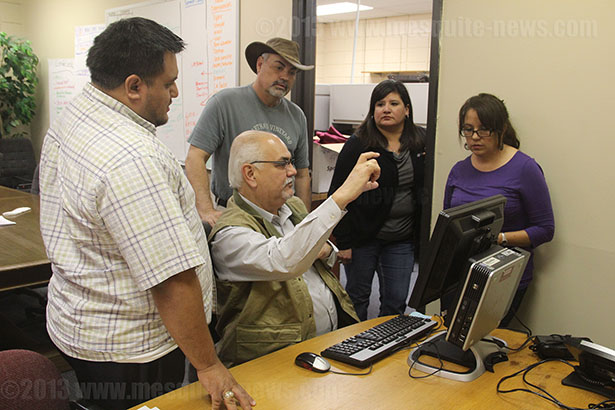
By Rossi Ramirez
Students in Texas’ rural colonias will now have access to the Internet and other resources with computer Internet access kiosks donated by the Texas A&M University Colonias Program.
Thirty newly refurbished computers, configured with an operating system that allows Internet access and cloud use, will be donated to 42 community resource centers located across lower, central, and western Rio Grande areas.
The Colonias Program, created through Texas A&M University-College Station’s College of Architecture, focuses on enhancing the quality of life in underserved areas by offering health, education, workforce and economic development programs for colonias residents.
Oscar J. Muñoz, director of the Colonias Program, said the kiosks will make a significant impact for many colonias residents along the Texas/Mexico Rio Grande border, especially for children who lack computers at home and who rely on community centers in their neighborhoods to complete their afterschool homework.
“Part of what we do is that we are a library and we are a homework hub for many of the kids in the colonias,” Muñoz said, referring to the community centers.
Texas A&M Colonias’ promotoras, or community health workers, will also be able to use the computers during the day to perform online health assessments, including access to healthcare.gov, among many other uses.
Colonias, a term for isolated border communities located along the southwestern edge of Texas near the Mexico border, are some of the poorest regions in the United States. Rural and urban communities in the colonias usually lack many essential resources such as electricity, water, housing, transportation and communication systems.
A Pew Internet and American Life Project survey concluded that rural Americans lag behind the rest of the nation when it comes to use of high-speed Internet connections at home; however, rural areas show fast growth in broadband uptake.
Muñoz said students in the Colonias have either minimal or no Internet reception at home.
In fact, Muñoz said that community center librarians alter their schedules to come in at 10 a.m. to 7 p.m. in order for the students to do their homework. It got to the point where they weren’t going home because the students do not have the resources to complete their schoolwork, he said.
“Because there isn’t enough money in the budget to keep up with paper to copy, the computers will provide not only students with access to do research and homework, Mom and Dad will be able to use the computers as well,” he said.
The idea to provide assistance to the Colonias Program began with Jason Vaughn, helpdesk manager at the Information Technology Services in the College of Architecture and senior associates James Gillette and James Rosser, according to Muñoz.
Vaughn did not respond for an interview request but Muñoz confirmed his involvement.
Vaughn suggested to use the surplus computers by reprogramming and updating them to operate with the thumb drive that will allow the computer to operate as an Internet-access kiosk. Once the thumb drive is ejected from the kiosk all information will erase, allowing the kiosk to never contact viruses or spyware.
The Colonias Program has 20 extra thumb drives to be installed. Once the current 30 computers are distributed, the old surplus computers from the community resource centers will be reprogrammed to function as Internet portals as well.
Students, adults and families will be able to learn how to access the Internet and visit medical sites, learn about prevention and inform themselves on different education opportunities.
“The kiosk are invaluable because rural colonias residents will be connected to the Internet by doing it very economically,” Muñoz said.






